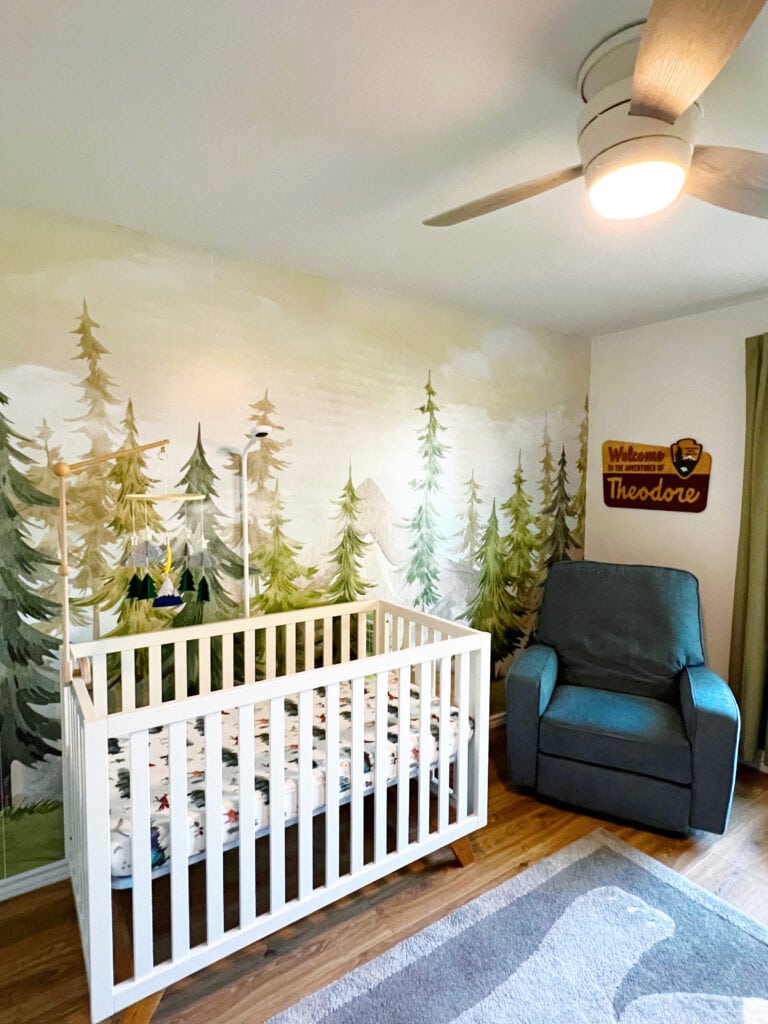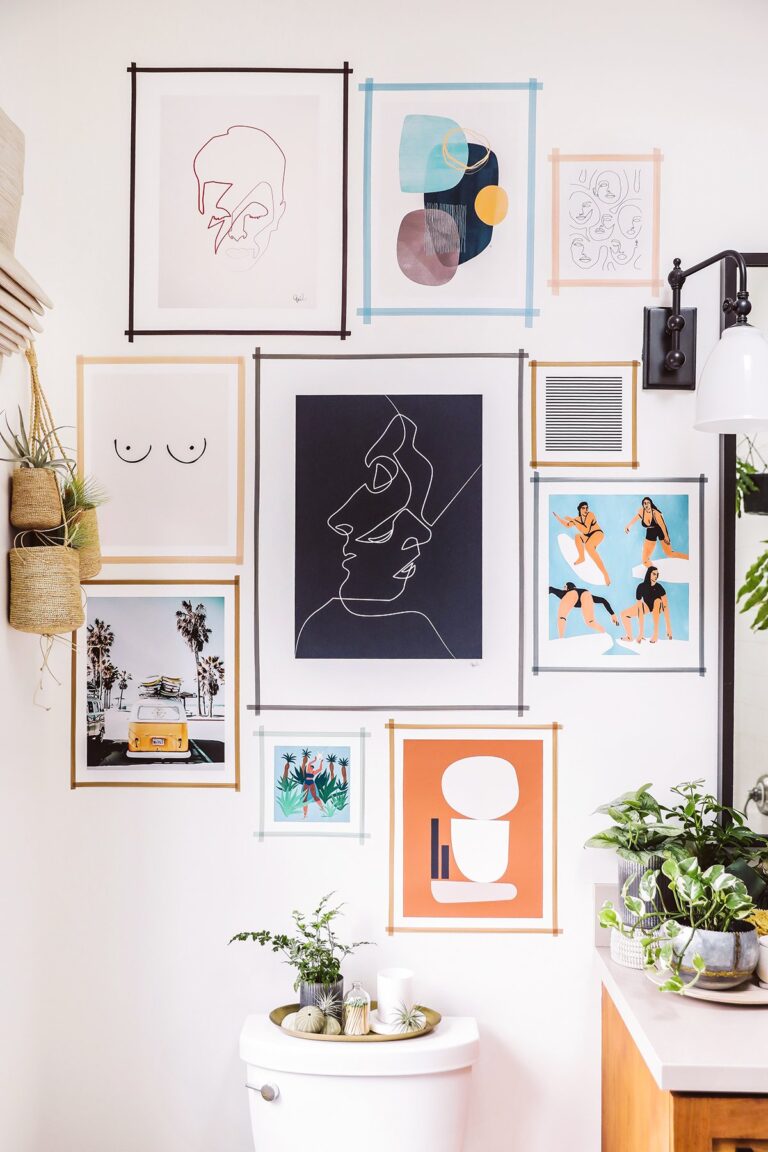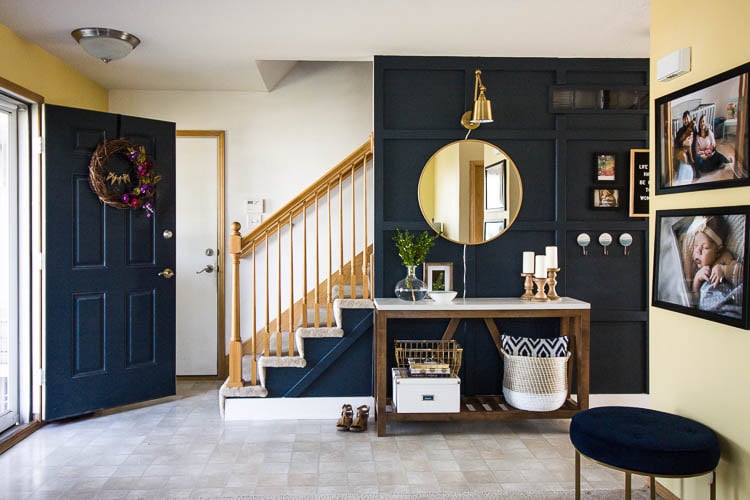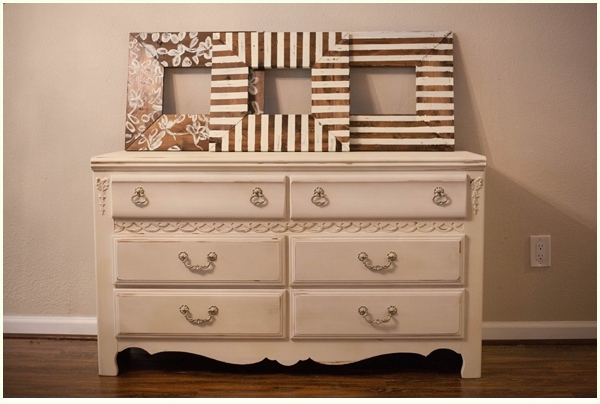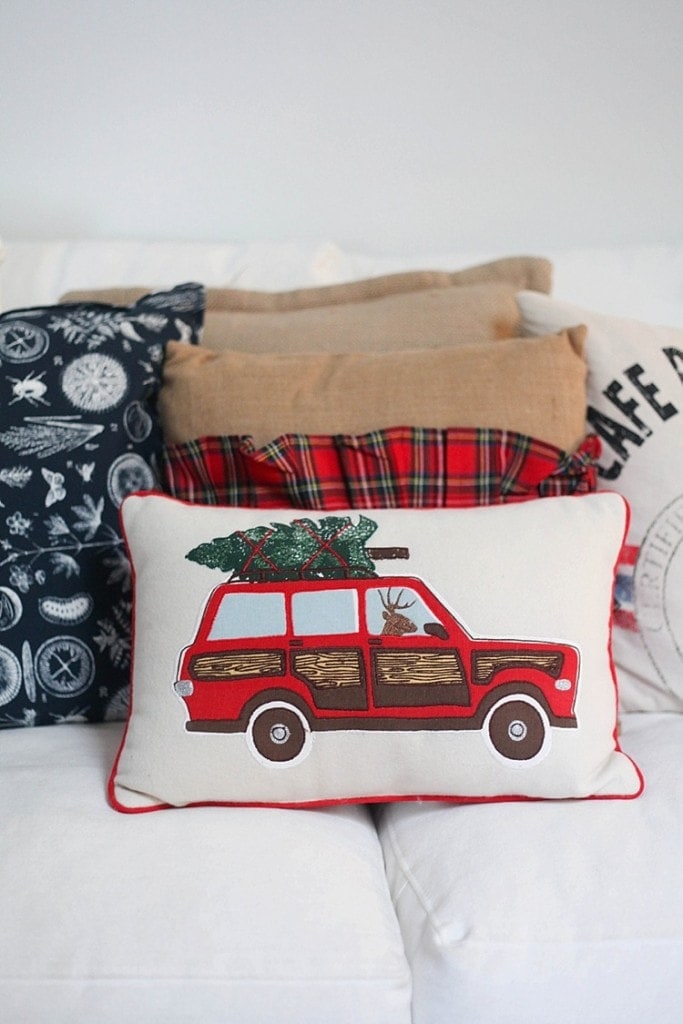The Feng Shui Bedroom
A Feng Shui bedroom should be the first step in introducing positive energy into your home. Design your bedroom using ancient principles with these twelve elements of a Feng Shui bedroom!
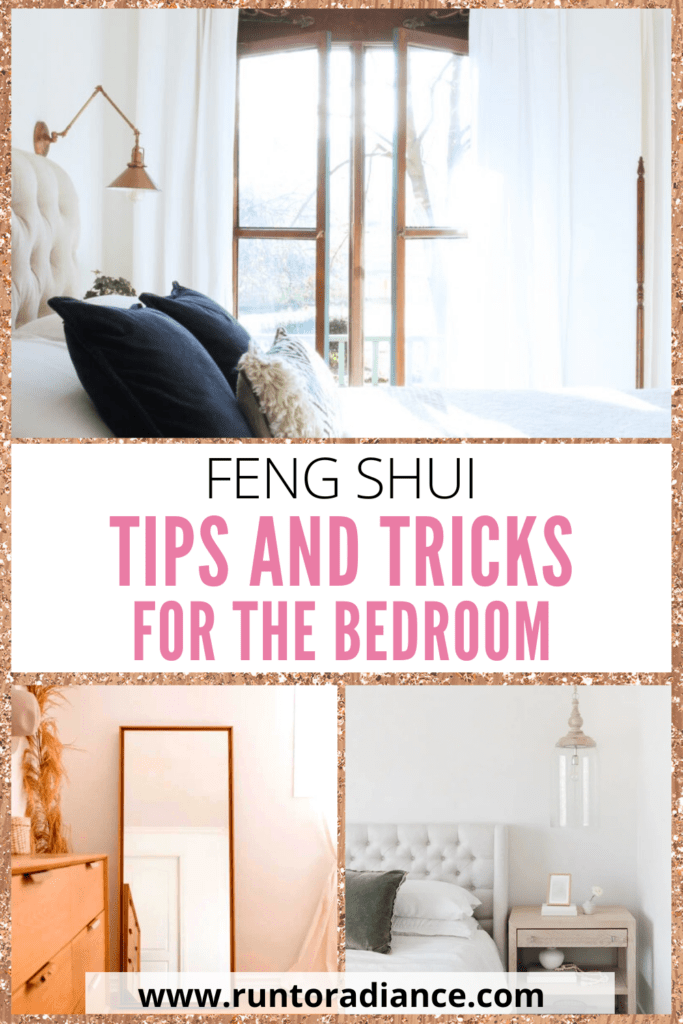
Have you been inspired by the power of Feng Shui? If so, it’s time to harness some of that power by creating a surplus of positive energy in your home. And what better way to start this process than to design an amazing Feng Shui bedroom?
Feng Shui is especially important to consider in the bedroom because of the time we spend inside it. With hours of sleep, relaxation, and preparation for our days, our bedrooms see it all!
I’ve compiled twelve elements of a Feng Shui bedroom to encourage positive energy in the room that needs it most.
What is Feng Sui?
Feng Shui is an ancient practice originating in China to create harmony between people and their environment.
In short, this practice refers to arranging the items in your home to create balance, promote positive energies, and align with the natural world.
Important terms to know:
- Chi – The flow of energy or the breath of life; can be positive or negative
- Qi – Life force or energy
- Flow – The movement of energy through a space
- Balance – Using the five elements of Feng Shui (fire, earth, metal, wood, and water) to create harmony
Benefits of a Feng Shui bedroom
So, what are the actual benefits of this ancient practice?
Feng Shui has many beneficial properties to enrich your home. The bedroom is the perfect place to start because of the many hours you spend sleeping and recharging. Some of the benefits of a Feng Shui bedroom include:
- Promotes peace & relaxation
- Improves sleep patterns
- Attracts love & passion
- Betters prosperity & good health
12 Elements of a Feng Shui bedroom
The principles of Feng Shui are incredibly useful when designing a bedroom. Follow these twelve elements of a Feng Shui bedroom to optimize the positive flow of energy in your sleeping quarters!
1. Bed placement
The bed is the most important part of any bedroom; because of how much time you spend in bed, it’s actually the most important piece of furniture in your house.
Whenever you are sleeping, you’re in a passive state and, therefore, more susceptible to energies, both good and bad. Think about all the time you spend sleeping; quite a bit, no?
For this reason, your bed placement should be precise. Place it in the commanding position or centerpiece of your room with the headboard against a solid wall.
There should be space on either side of your bed, enough that you have ample space to move about.
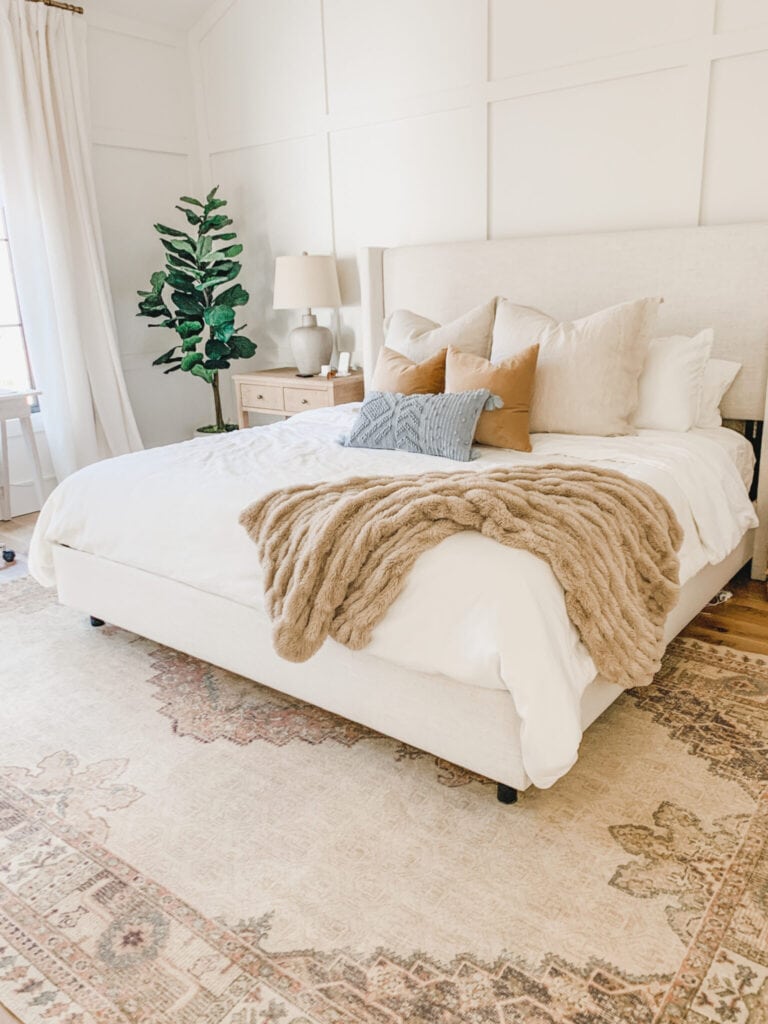
Other bed placement rules:
- Avoid placing your bed against a wall with a toilet on the other side
- Don’t place your bed underneath sloped ceilings or beams
- Make sure your bed does not align directly with a door
2. Balanced bedside tables
Because the bed is so important, it’s only expected that its surroundings are as well!
Nightstands should be placed symmetrically on either side of your bed; this is to encourage a balance of energies and “double happiness.”
Also, keep in mind the height of your nightstands. A nightstand’s height should not be higher than your head while sleeping. Ideally, the nightstand should be lower than the mattress. This lower height hides a table’s corners, which are not recommended in Feng Shui.
Sharp corners are known as “poison arrows” and are too harsh for a bedroom; to sleep with them close to your face would create negative energy. For this reason, opt for rounded tables over square or rectangular choices.
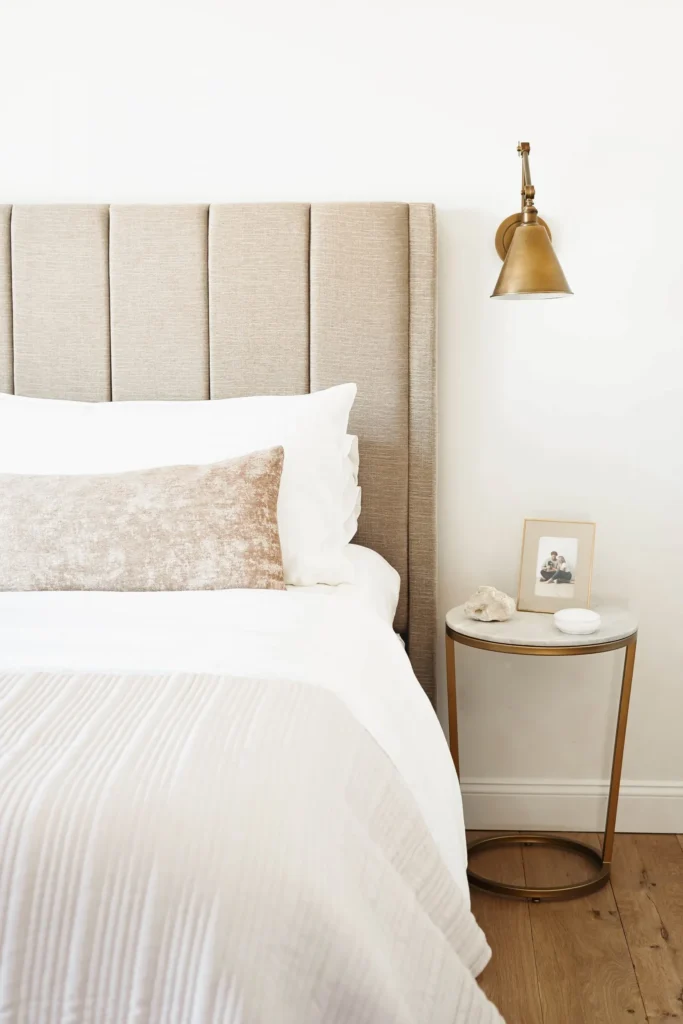
3. Purposeful objects on your nightstand
Feng Shui is not a big fan of clutter. This is because clutter tends to encourage negative energy and a cluttered mind.
Because nightstands tend to become a catchall for the objects we use throughout the day, a bit of clutter is kind of inevitable.
Make a conscious effort to keep your nightstands clean and clutter-free with minimal decoration. If your nightstands begin to catch clutter throughout the day (hey, we’re not perfect!), take a few minutes to clear them before you sleep.
Objects to include on your nightstand:
- Candles to encourage peace, serenity, and positive energy
- Potted plants (real and well-kept) to attract positive chi
- Crystals to encourage a variety of benefits
Objects to avoid on your nightstand:
- Catch-all clutter
- Maximalist decorations
- Heavy objects
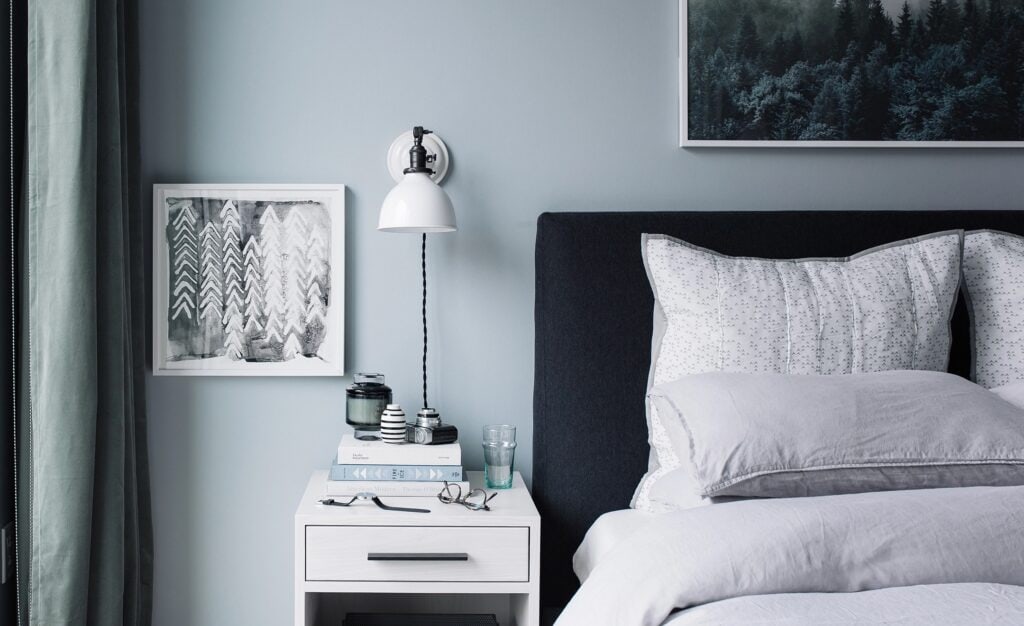
4. Closed doors
Do you sleep with your doors open or closed? Many of us are steadfast in our preferences. But what does Feng Shui say?
Feng Shui recommends you sleep with your bedroom door closed as you sleep, the thought being that you can trap positive energy inside.
If you sleep with your door open, you run the risk of letting positive energy out and in its place, inviting in negative energy.
To perfect the flow in your Feng Shui bedroom, try keeping all doors closed. This includes:
- Closet doors
- Drawers
- Bathroom doors
- Doors throughout the house
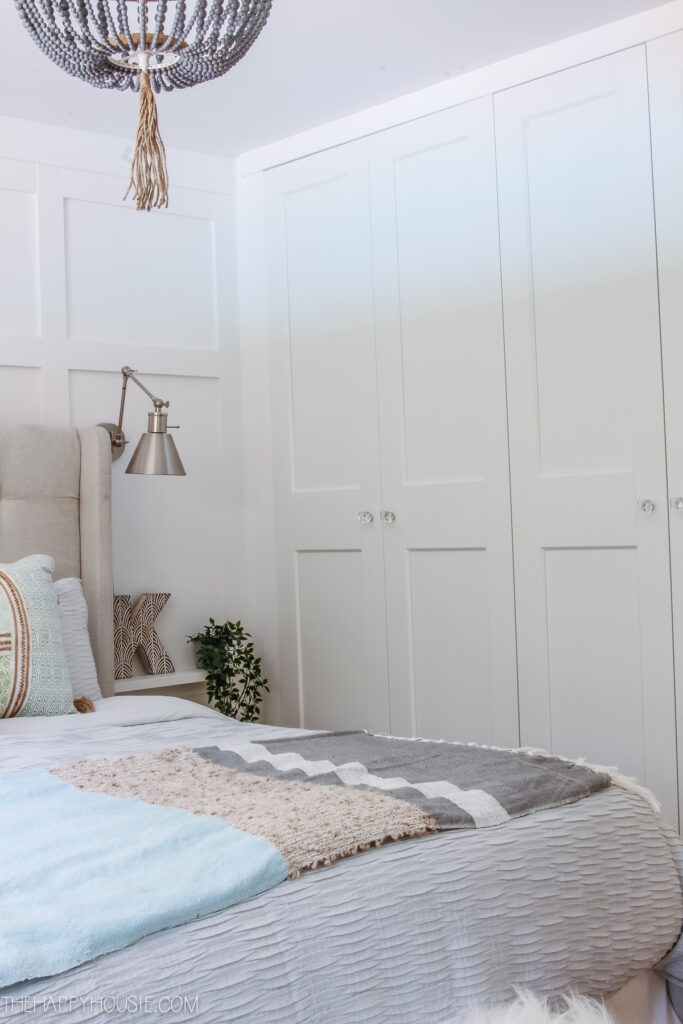
5. Fresh air
Ensure you have plenty of fresh air in your bedroom for proper Feng Shui. This includes clean, open windows that let in plenty of natural light and airflow.
This is an important basis for the continual flow of positive energy or “chi.”
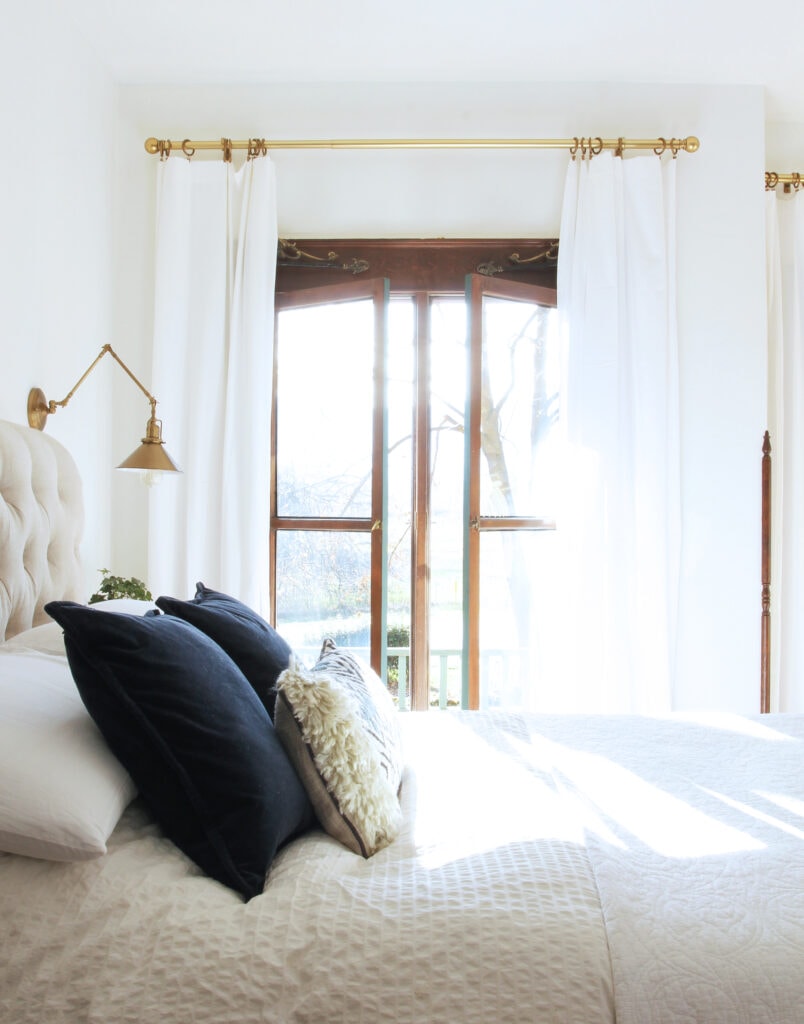
6. Lighting levels
Lighting is integral to the energy of any room. Bedrooms should have soft lights to encourage positive energy (avoid fluorescents at all costs!).
Other bedroom lighting tips:
- Avoid harsh overhead lighting
- Try installing dimmers to better control your lighting
- Use lighting at various levels from various sources
- Try candles for lighting with boundless positive chi
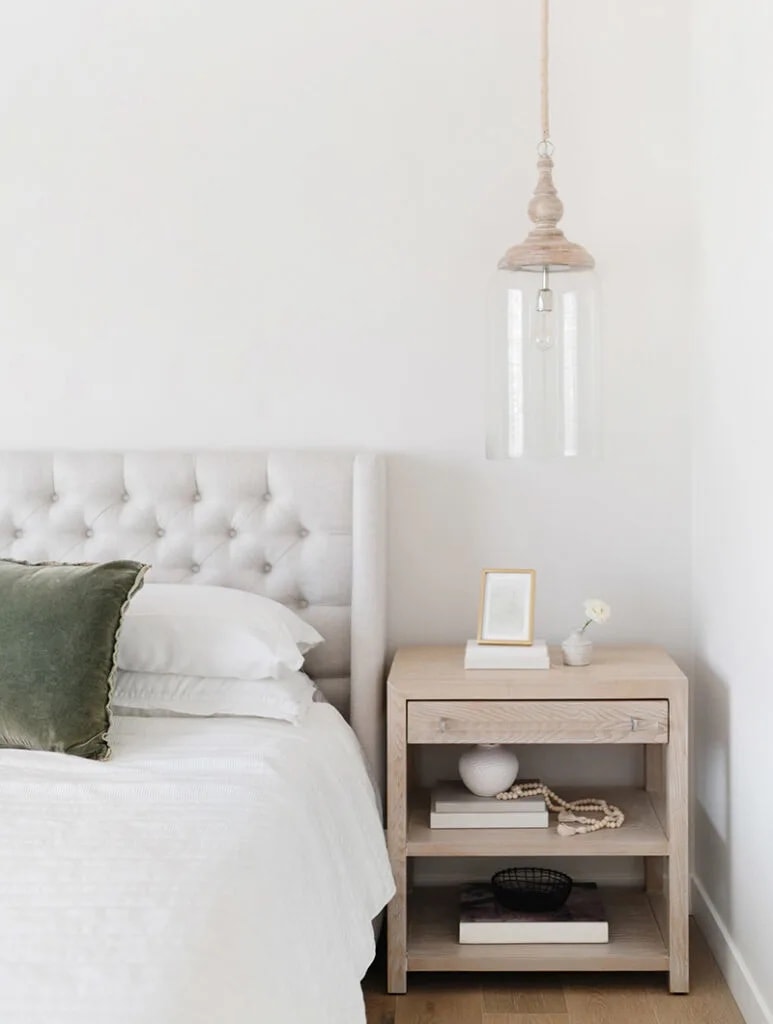
7. Calming art
When choosing art for optimal bedroom Feng Shui, pay attention to both energy and harmony.
Art should be emotionally relaxing and positive. Try looking for calm, muted colors like blues, greens, and browns. Bright colors tend to be too provoking.
Your colors should also be in harmony with the rest of the room’s décor.
More art considerations for a Feng Shui bedroom layout:
- Low-hung art will lower your qi (energy)
- Hang large décor in large rooms, and smaller pieces in small rooms.
- For dynamic Feng Shui energy, mix shapes and styles of artwork
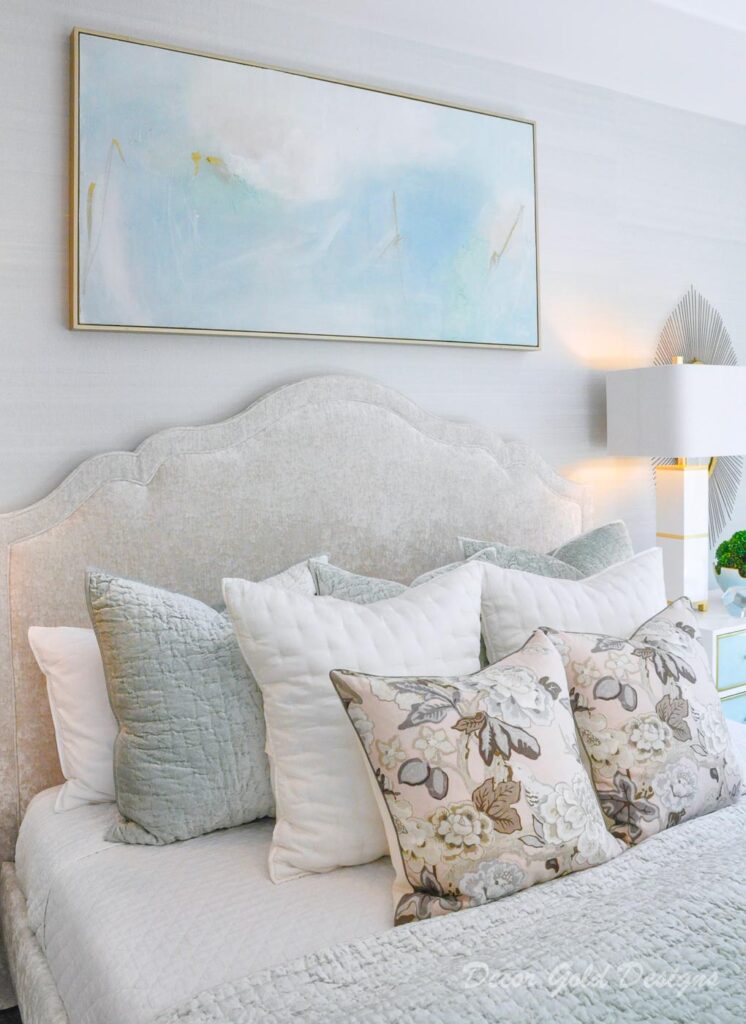
8. A solid headboard
Choose a bedframe with a solid headboard, placed against a solid wall. This evokes balance and stability in your bedroom.
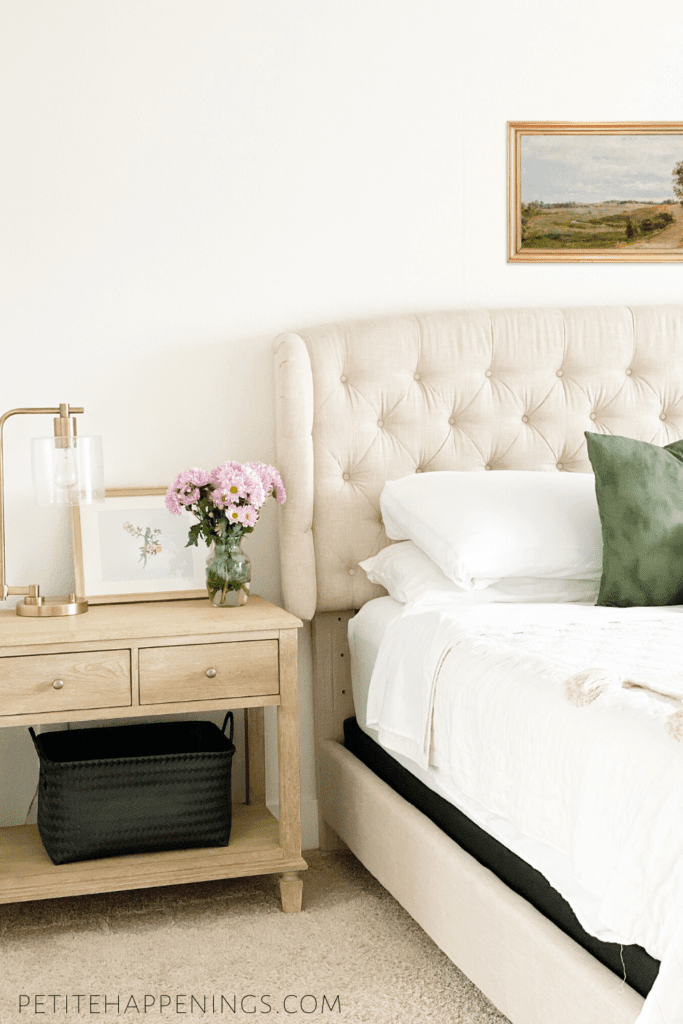
9. A muted color scheme
Though you can choose any color scheme to decorate in Feng Shui, muted colors tend to suit a bedroom because they promote peace and relaxation.
When in doubt, choose the colors that you are most attracted to. We tend to favor colors that will most benefit us – listen to this intuition.
Unsure of which colors to choose? Here’s what Feng Shui says about colors and their power:
- Purple – Prosperity
- White – Simplicity
- Black – Wisdom
- Earth tones – Balance
- Rose and pink – Romance
- Navy – Spirituality
- Greens & Blues – Wellness
- Gray – Support
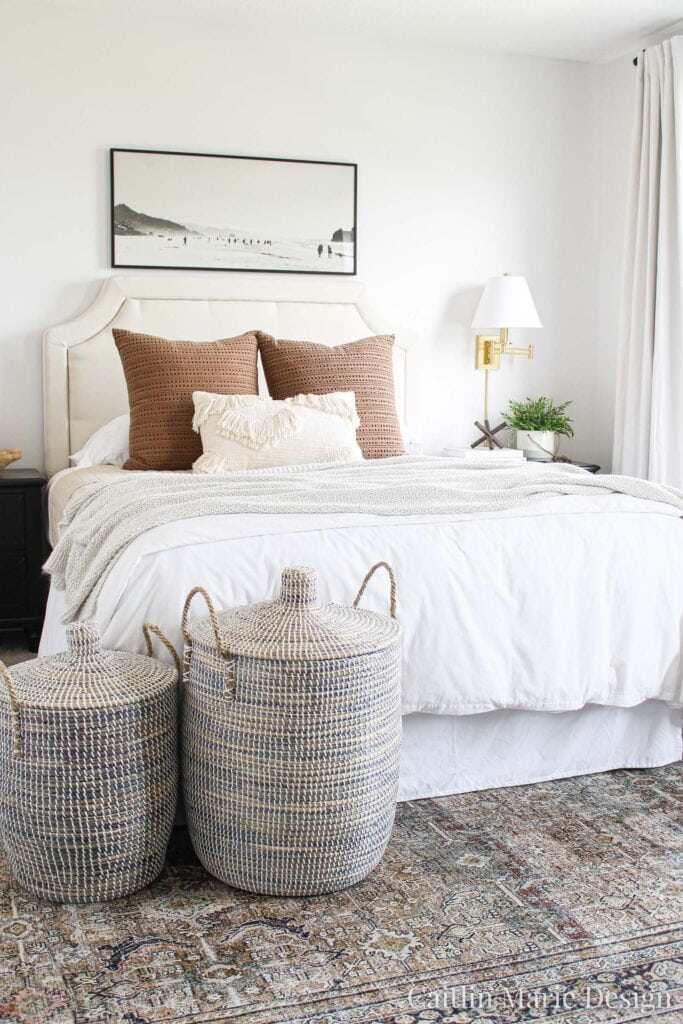
10. Candles and light fixtures
Lighting sources should be varying and ample in your bedroom. Because we want to avoid harsh, overhead lighting, you get to be super creative with your lighting sources!
Feng shui favors candles in particular but they are not always the most functional choice. You can also opt for bedside lamps, standing lamps, and other, gentle sources of light.
Bonus lighting tip – Place candles in the back right-hand corner of your bedroom to improve your love life!

11. Mirror placement
Mirrors tend to evoke a bit of controversy in the world of Feng Shui. According to some, mirrors have no place in a bedroom at all. Others allow it.
In terms of mirrors in a Feng Shui bedroom, do what feels best for you. If you choose to include a mirror in your bedroom, include a high-quality piece and avoid buying them secondhand. Vintage mirrors can hold onto negative energy from past owners.
If having a mirror in your room makes you feel uneasy for any reason, listen to your instincts and remove it.
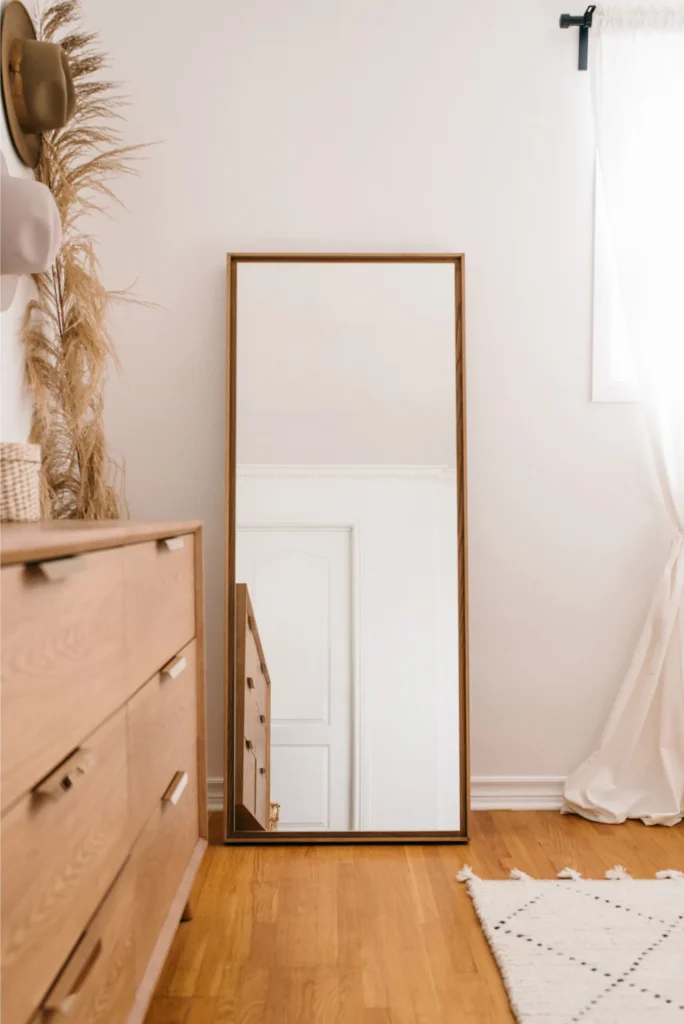
12. Real plants
Plants are a wonderful way to incorporate positive energy into your bedroom; they cleanse the air in your space and contribute to the positive flow of chi.
Ensure that when you’re purchasing greenery for your home you choose real, living plants. Fake plants do not have the same effects on energy because they are not living beings.
Important Note – plants also have the power to create negative energy if they are wilted or dead. The thought is that seeing these plants in need will evoke negative thoughts. Ensure you’re taking proper care of your plants to avoid damaging the flow of the room.
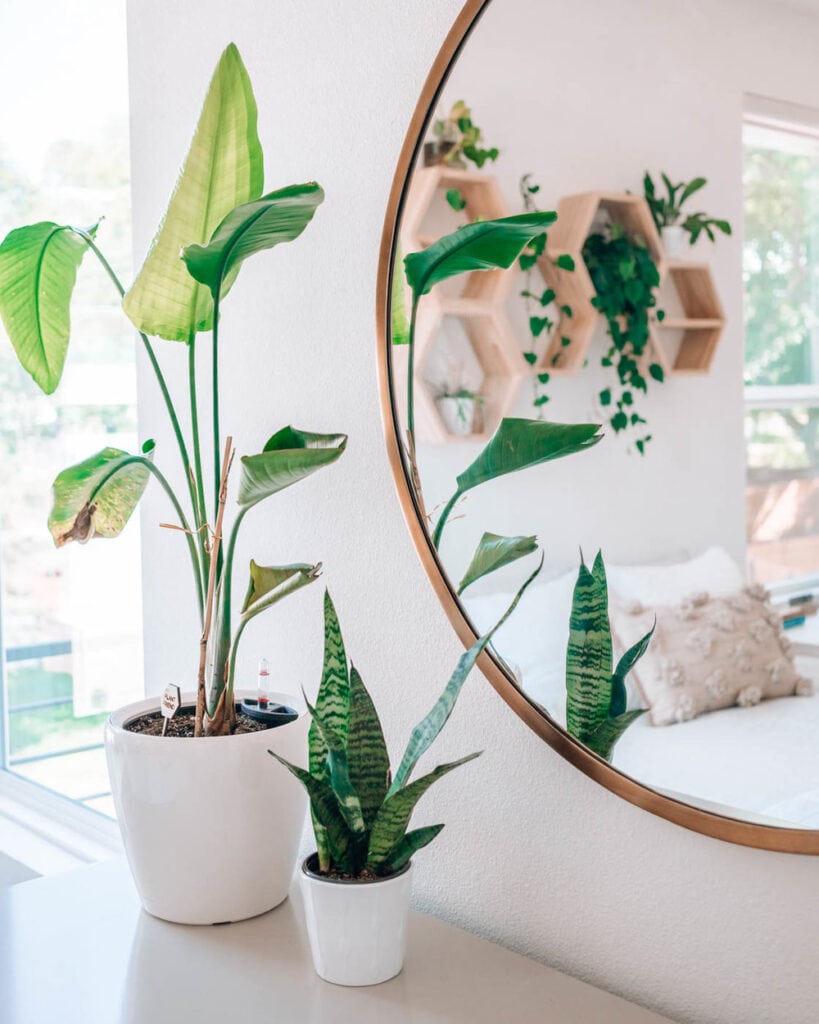
Final thoughts on the Feng Shui bedroom
Feng Shui is an amazing tool to encourage positive energy and flow into your life, in and out of the bedroom.
So, are you ready to integrate Feng Shui into your sleeping quarters? Let me know your plans to optimize the positive chi in your bedroom in the comments down below!

More design content
- The Best Bedroom Paint Colors to Use
- Baby Boy Nursery Tour: Nation Parks Themed Nursery
- How to Decorate Shelves
- The Best Peel and Stick Wallpaper Ideas
- How to Decorate Around a TV
Tania Griffis is an accomplished writer, blogger, and interior designer with a Journalism degree from the University of Oklahoma. She started her popular blog, Run to Radiance, in 2011, demonstrating her design expertise through the personal remodeling of six houses to millions of readers across the globe.
Tania also owns The Creative Wheelhouse, a respected ghostwriting agency for bloggers, further showcasing her talent for creating engaging and informative content.


